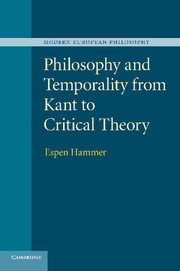Book contents
- Frontmatter
- Contents
- Acknowledgments
- Introduction
- 1 The historicity of time
- 2 Modern temporality
- 3 Two responses to the time of modernity
- 4 Hegel's temporalization of the absolute
- 5 Schopenhauer and transcendence
- 6 Time and myth in the early Nietzsche
- 7 Recurrence and authenticity: the later Nietzsche on time
- 8 Heidegger on boredom and modernity
- 9 A modernist critique of postmodern temporality
- Conclusion
- Bibliography
- Index
7 - Recurrence and authenticity: the later Nietzsche on time
Published online by Cambridge University Press: 21 April 2011
- Frontmatter
- Contents
- Acknowledgments
- Introduction
- 1 The historicity of time
- 2 Modern temporality
- 3 Two responses to the time of modernity
- 4 Hegel's temporalization of the absolute
- 5 Schopenhauer and transcendence
- 6 Time and myth in the early Nietzsche
- 7 Recurrence and authenticity: the later Nietzsche on time
- 8 Heidegger on boredom and modernity
- 9 A modernist critique of postmodern temporality
- Conclusion
- Bibliography
- Index
Summary
Nietzsche eventually rejected some of the key assumptions behind The Birth of Tragedy. For a start, he became dissatisfied with Wagner and the Wagner cult, thinking that rather than bringing about conditions for a renewal of German culture, they were actually aligned with the project of modernity and therefore symptoms of the very predicament he sought to overcome. In The Case of Wagner (1888), but also in writings from the latter half of the 1870s, Nietzsche considered Wagner's music to be artificial and decadent, an expression, ultimately, of Christian values and, in particular, resentment against life as such. Another reason why Nietzsche went beyond his early account is that he came to dismiss Schopenhauer's metaphysics, which he gradually came to think had its roots in the Christian tradition from which he later sought to disengage himself. However, Nietzsche was not just dismayed by his youthful infatuation with Wagner and Schopenhauer. He was also losing faith in the possibility and even desirability of retrieving a mythical conception of time. In the late 1870s, Nietzsche bade farewell to his altphilologische hopes, realizing that the orientation towards myth could not be combined with his increasing interest in innovation and self-transformation. For the later Nietzsche, emphasizing creation and freedom, the mythical conception of time became untenable.
From history to life
After the mid-1870s a new sensibility enters Nietzsche's writings.
- Type
- Chapter
- Information
- Philosophy and Temporality from Kant to Critical Theory , pp. 144 - 160Publisher: Cambridge University PressPrint publication year: 2011



